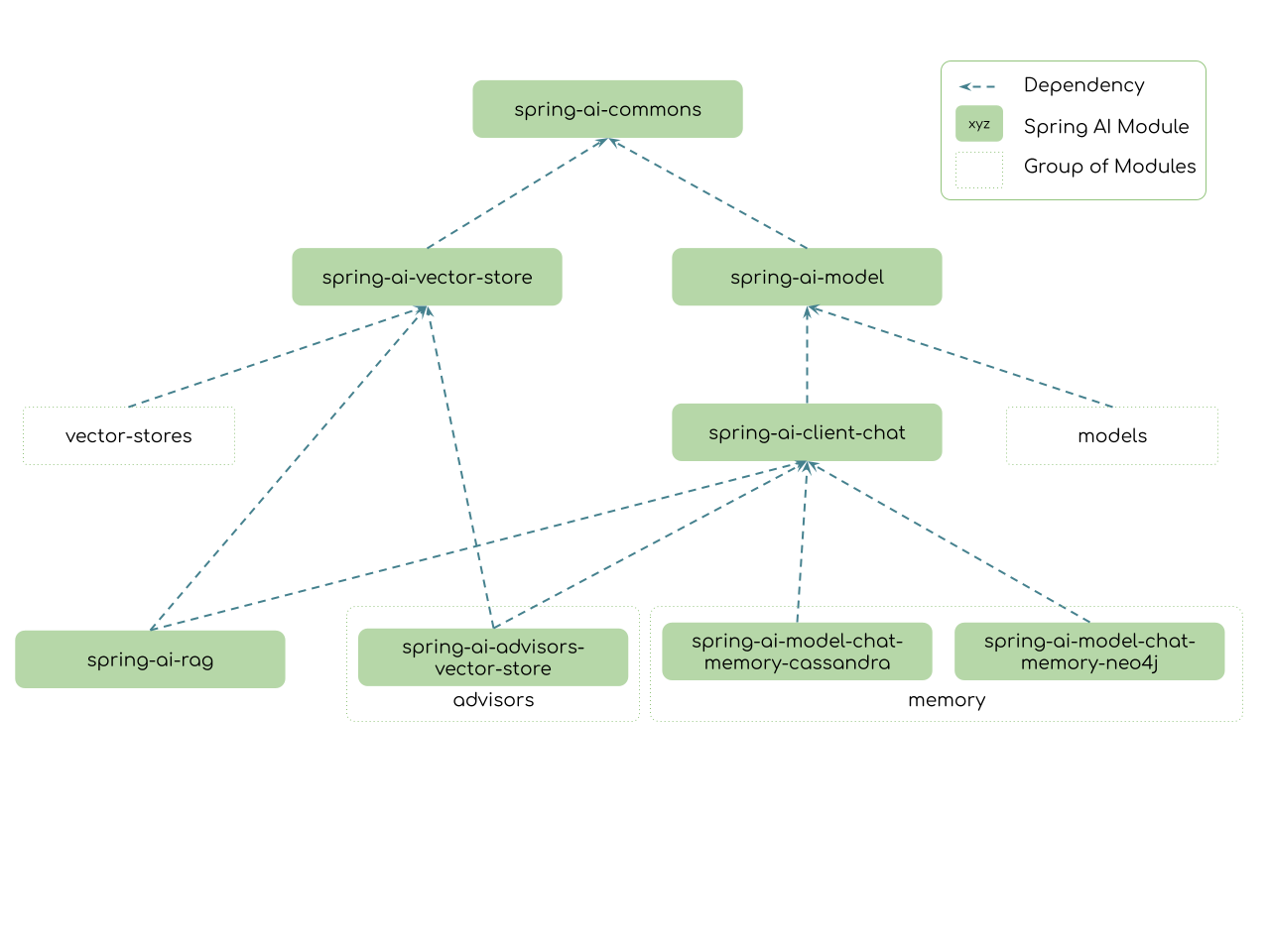Get ahead
VMware offers training and certification to turbo-charge your progress.
Learn moreWe are excited to announce the release of Spring AI 1.0.0 Milestone 7. This will be the last milestone release. Next month will be the RC1 release followed quickly by a GA release in time for the Spring IO conference in Barcelona.
To celebrate this release, we have added a new song to our AI-generated music playlist featuring lyrics by Josh Long and Claude! Check out the latest track to enhance your blog reading and coding experience.
Here are the key changes in this release. Note, there are breaking changes!
Spring AI 1.0.0-M7 introduces several important changes that align with the structural improvements previously introduced in the SNAPSHOT versions. These changes create a more modular and maintainable codebase while reducing unnecessary dependencies in your applications.
The most significant change is the naming pattern for Spring AI starter artifacts:
spring-ai-{model}-spring-boot-starter → spring-ai-starter-model-{model}spring-ai-{store}-store-spring-boot-starter → spring-ai-starter-vector-store-{store}spring-ai-mcp-{type}-spring-boot-starter → spring-ai-starter-mcp-{type}Some classes have moved to new packages to better reflect their domain responsibilities:
KeywordMetadataEnricher and SummaryMetadataEnricher moved from org.springframework.ai.transformer to org.springframework.ai.chat.transformerContent, MediaContent, and Media moved from org.springframework.ai.model to org.springframework.ai.contentYour IDE should easily be able to handle these refactorings.
As detailed in the Core Architecture Improvements section above, the project has been restructured from a monolithic core into specialized domain modules.
This modular approach allows you to include only the functionality you need, resulting in smaller deployments and clearer boundaries between components.
Importantly, this change should not be a breaking change if you use the Spring AI starters since they now import the new modular dependencies automatically. Only applications that directly referenced the previous monolithic artifacts will need to update their dependencies.
The ToolContext class has been enhanced to support both explicit and implicit tool resolution, with tools only included in model calls when explicitly requested.
For more details on these changes, refer to:
There are two ways to update your projects to Spring AI 1.0.0-M7:
Use the Claude Code CLI tool tool with this prompt. You can use other AI assistant tools as well, but we have only tested using Claude Code. Note that this automated approach handles artifact ID changes, package relocations, and module structure changes, but does not yet include automatic changes for upgrading to MCP 0.9.0.
Refer to the Upgrade Notes for detailed instructions, including guidance on manually updating MCP-related code.
Comprehensive Modular Architecture

spring-ai-commons: Foundation module with no dependencies on other Spring AI modules
Document, TextSplitter, etc.)spring-ai-model: Builds on commons to provide AI capability abstractions
ChatModel, EmbeddingModel, and ImageModelToolDefinition, ToolCallback)spring-ai-vector-store: Unified vector database abstraction
VectorStore interface for similarity searchSimpleVectorStore for in-memory usagespring-ai-client-chat: High-level conversational AI APIs
ChatClient interfaceChatMemoryOutputConverterspring-ai-advisors-vector-store: Bridges chat with vector stores for RAG
QuestionAnswerAdvisor: injects context into promptsVectorStoreChatMemoryAdvisor: stores/retrieves conversation historyspring-ai-model-chat-memory-*: Specialized persistence implementations
spring-ai-rag: Comprehensive framework for Retrieval Augmented Generation
RetrievalAugmentationAdvisor as main entry pointModular Autoconfiguration
spring-ai-autoconfigure-model-{model}spring-ai-autoconfigure-vector-store-{store}spring-ai-autoconfigure-mcp-{type}Package Reorganization
KeywordMetadataEnricher and SummaryMetadataEnricher moved from org.springframework.ai.transformer to org.springframework.ai.chat.transformerContent, MediaContent, and Media moved from org.springframework.ai.model to org.springframework.ai.contentFramework Enhancements
Spring AI 1.0.0-M7 integrates the latest MCP reference implementation Java SDK version 0.9.0, bringing significant architectural improvements:
These improvements result in a more robust, scalable MCP implementation that better aligns with the MCP specification. For detailed migration guidance, refer to the Upgrade Notes section on MCP Java SDK changes.
All examples in the Spring AI Examples repository have been updated to work with the latest MCP implementation.
Anthropic Claude Updates
Mistral AI Enhancements
Ollama Improvements
Azure OpenAI Updates
OpenAI Enhancements
Spring AI 1.0.0-M7 adds support for Docker Desktop 4.40's Model Runner, providing a seamless integration with locally running AI models:
spring.ai.openai.api-key=ignored
spring.ai.openai.base-url=http://localhost:12434/engines
spring.ai.openai.chat.options.model=ai/gemma3
For detailed information, check out the Spring AI Docker Model Runner documentation and our accompanying blog post Spring AI with Docker Model Runner that dives deeper into this integration.
Special thanks to Eddú Meléndez for his significant contributions to this feature.
Tool Execution Framework
Multimodality Support
Document Processing
Chat Memory Implementations
Vector Store Enhancements
Spring Boot Integration
AOT and Native Image Support
Documentation
There were other refactoring, bug fixing, documentation enhancements across the board by a wide range of contributors. If we haven't gotten to your PR yet, we will, please be patient. Thanks to